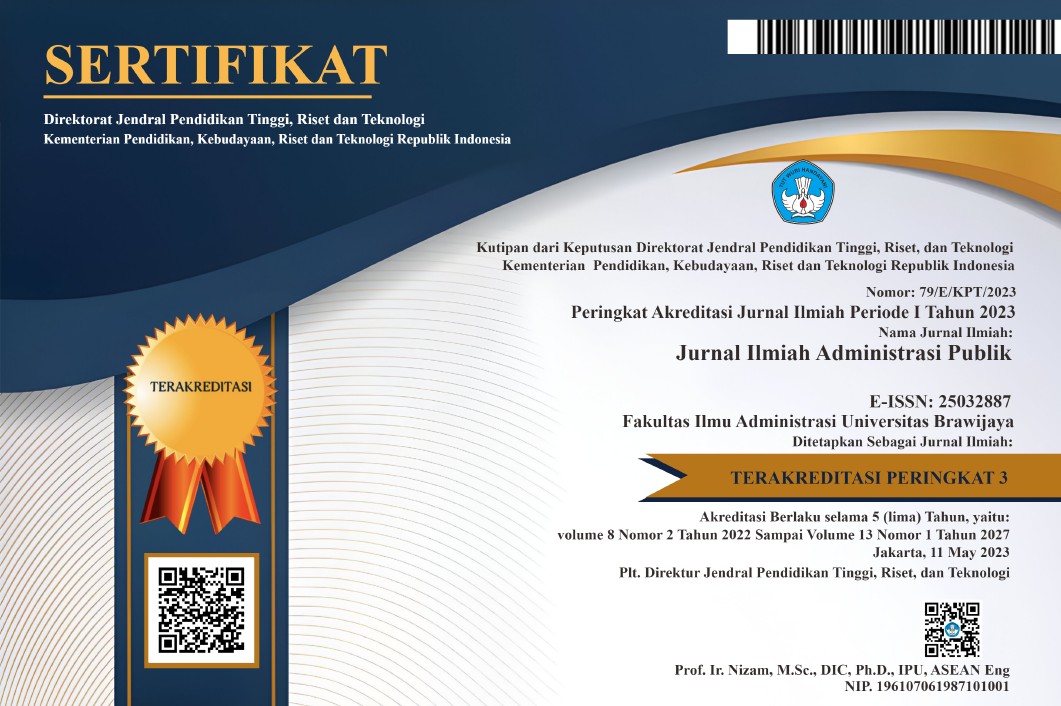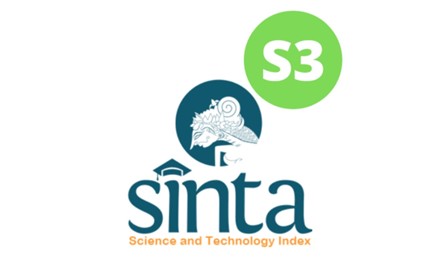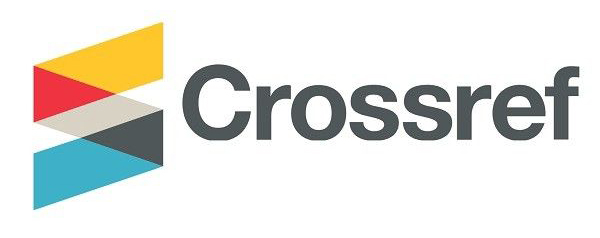Kolonisasi Politik dalam Kebijakan Inovasi Pemerintahan Daerah
Keywords:
political colonization, local government innovationAbstract
The question posed in this research is "Do political institutions participate in producing products and carry out various influences on innovation policies?" This study contributes to understanding the role of politics in innovation policies in local government. This research was conducted in two areas, namely Malang City and Malang Regency. The method used is available data analysis (secondary data). There are 4 focus studies that are examined. There are two analyzes used in this study, namely: First, the data obtained secondary to descriptive analysis was carried out with Excel, then further analyzed using SmartPLS for inference analysis. The findings of this study reveal that the political environment has a negative relationship with both innovation achievements and local government performance. However, in elaboration on policies, it turns out that political colonization occurs in policy products. This research also reveals why innovative areas are never sustainable in terms of their innovation achievements. Although this research can reveal policy colonization by the political environment, the limitations of the scope of the research area, and the scale used to limit this research. For this reason, it is advisable for a more detailed study by expanding and comparing the regions, both those interpreted in the IGA and TOP 99, and those that are not.
References
Apolitical.co. (2019, February 1). What is government innovation? Retrieved from ANALYSIS / GOVERNMENT INNOVATION AND LEADERSHIP: https://apolitical.co/en/solution_article/what-is-government-innovation
Budiardjo, M. (2008 ). Dasar Dasar Ilmu Politik. Jakarta: PT. Gramedia Pustaka Utama.
Borrás, Susana; Edquist, Charles., October 2013, The Choice of Innovation Policy Instruments, Technological Forecasting and Social Change 80(8):1513-1522. DOI: 10.1016/j.techfore.2013.03.002
Chris Kimble, Corinne Grenier, Karine Goglio-Primard, 2010, Innovation and knowledge sharing across professional boundaries: Political interplay between boundary objects and brokers, International Journal of Information Management, In Press, Corrected Proof, Available online 12 March
Courvisanos, Jerry, September 2009, Political aspects of innovation, Research Policy, Volume 38, Issue 7, Pages 1117-1124
Edwards, Tim, 2007, Organizational politics and the “process of knowingâ€: Understanding crisis events during project-based innovation projects, European Journal of Innovation Management; Volume: 10 Issue: 3
Edler, J., & Fagerberg, J. (2017). Innovation policy: what, why, and how. Oxford Review of Economic Policy, 33(1), 2-23.
Eggers, William D. and Singh, Shalabh Kumar, 2009, The Public Innovator’s Playbook: Nurturing Bold Ideas in Government, Harvard Kennedy School
Egri, P. J. (1990). Influence of Political Action on Innovation: Part II. Leadership & Organization Development Journal, 11(2), 4-12.
Eva Sørensen and Susanne Boch Waldorff, 2014, Collaborative policy innovation: Problems and potential, The Innovation Journal: The Public Sector Innovation Journal, Volume 19(3), 2014, article 2
Gardey, Damien; Carassus, David; Favoreu, Christophe; Christophe, Maurel, January 2014, Characterization and definition of public performance: an application to local government authorities, Gestion et Management Public 2/3(1), DOI: 10.3917/gmp.023.0023
Galle, Brian D. and Leahy, Joseph Kieran, 2009, Laboratories of Democracy? Policy Innovation in Decentralized Governments, Emory Law Journal, Vol. 58, p. 1333-1400
Jakobsen, Stig-Erik; Bernt Aarset, 11 February 2010, Institutions as facilities for change?: A study of the coherence between political regulations and innovations within the pelagic fisheries sector in Norway, Marine Policy, Corrected Proof,
Jewell, C. (2015, September ). Global Innovation Index 2015: Effective Innovation Policies for Development. Retrieved from WIPO Magazine: https://www.wipo.int/wipo_magazine/en/2015/05/article_0002.html
Leeuw, Evelyne de, May 2013, The Public Policy Approach: Governments, Institutions, Welfare States and Social Justice, In book: Global Handbook on Noncommunicable Diseases and Health Promotion, DOI: 10.1007/978-1-4614-7594-1_15
Lynn, Laurence E., Jr. and Robichau, Robbie Waters 2013, Governance and organisational effectiveness: towards a theory of government performance, Journal of Public Policy, Volume 33, Issue 02, August 2013, pp 201 - 228
Millan, J. H., & Sally Schumacher. (2001). Research in Education. United States: Long Man Inc.
Morabito, Melissa Schaefer, 2008, The adoption of police innovation:the role of the political environment, Policing: An International Journal of Police Strategies & Management, Vol. 31 No. 3, pp. 466-484
Neera Shrestha Pradhan, Yufang Su, Yao Fu, Liyun Zhang, Yongping Yan, 2017, Analyzing the Effectiveness of Policy Implementation at the Local Level: A Case Study of Management of the 2009–2010 Drought in Yunnan Province, China, International Journal of Disaster Risk Science, March 2017, Volume 8, Issue 1, pp 64–77
Nishihara, Ayano Hirose (et.al), 2018, Knowledge Creation in Public Administrations: Innovative Government in Southeast Asia and Japan, This Palgrave Macmillan
Norman, Jacknis, (2011) "Government's Role In Facilitating An Innovative Economy", International Journal of Innovation Science, Vol. 3 Issue: 3, pp.107-116,
OECD. (2020). EMBRACING INNOVATION IN GOVERNMENT: Global Trends 2019. Retrieved from OECD-OPSI-MBRCGI: https://trends.oecd-opsi.org/
Sheehan, Maura; Garavan, Thomas N; Carbery, Ronan, January 2014, Innovation and human resource development (HRD), European Journal of Training and Development 38(1/2). DOI: 10.1108/EJTD-11-2013-0128
Singarimbun, M., & Efendi, S. (1985). Metode Penelitian Survai. Jakarta: LP3ES.
Sørensen, E., & Boch, W. S. (2014). Collaborative Policy Innovation: Problems and potential. Innovation Journal, 19(3), 1-17.
Taylor, M. Z. (2018, JUNE 21). The Politics of Innovation: Why Some Countries Are Better Than Others at Science and Technology. Retrieved from Information Technology and Innovation Foundation: https://itif.org/
Xie, Wei and Richard Li-Hua, 2009, What will make China an innovation-oriented country?, Journal of Knowledge-based Innovation in China, Vol. 1 No. 1, pp. 8-15
Walker, Richard; Boyne, George A; Andrews, Rhys., February 2011, The Impact of Management on Administrative and Survey Measures of Organizational Performance, Public Management Review 13(2):227-256. DOI: 10.1080/14719037.2010.532968
Wang, Chia-Huang, 2007, Is Taipei an Innovative City? An Institutionalist Analysis, East Asia, December 2007, 24:381
Wei Xie and Richard Li-Hua, 2009, What will make China an innovation-oriented country? Journal of Knowledge-based Innovation in China, Vol. 1 No. 1, pp. 8-15
Wessner, Charles W., (ed), 2013, Best Practices in State and Regional Innovation Initiatives: Competing in the 21st Century, National Academies Press, Washington, DC
Wolf, P. (2012, May 7). LEADERSHIP, MISCELLANEOUS. Retrieved March 13, 2020, from 6 REASONS WHY GOVERNMENT IS NOT MORE INNOVATIVE: https://www.govloop.com
Downloads
Published
Issue
Section
License
Copyright (c) 2021 Jurnal Ilmiah Administrasi Publik

This work is licensed under a Creative Commons Attribution-NonCommercial 4.0 International License.
If your paper is accepted, the author identified as the formal corresponding author for the paper will receive an email prompting them to login into Author Services; where via the JIAP Author Licensing Service they will be able to complete the license agreement on behalf of all authors on the paper.














